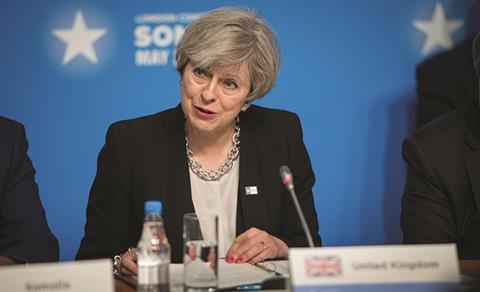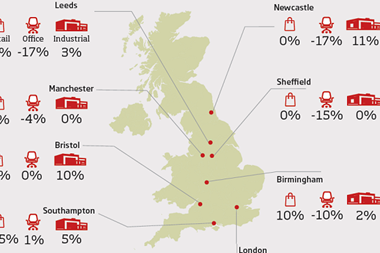Aside from Brexit, housing is perhaps the most important political battleground ahead of next month’s general election.

Asked for his number one policy priority earlier this month, Labour leader Jeremy Corbyn said it was tackling the housing crisis. And last weekend, Theresa May made her clearest statement of intent on the issue yet, pledging to kickstart a wave of housebuilding by councils and housing associations.
May promised to give more money to local authorities to encourage them to get involved with development and build a “new generation of council homes”. She also said she would allow councils to borrow more money, and reform compulsory purchase powers so that councils could buy land for housing more cheaply.
Currently, councils work on the assumption that the land will gain planning permission and pay a corresponding price - but May has proposed that they should now pay a lower price in line with the value of land without planning permission.
It is this measure that has proven most controversial. The compulsory purchase order (CPO) changes would theoretically make it easier to assemble sites for housing developments and leave more money in council piggy banks to reinvest into the social housing system. But it could also leave landowners short-changed, forcing them to give up their land for less.
‘Strong opposition’
Grant Leggett, director at planning consultancy Boyer, says that the government would face strong opposition to the changes.
“Landowners will feel very hard done by,” he explains. “You’re talking about throwing people off their land where they’ve potentially been running a business for their whole lives. CPOing things and cutting people out of the value is pretty unpleasant.”
His concerns are echoed by Colin Cottage, partner at consultancy Glenny, who believes the changes could be fraught with legal difficulty. “It would be a radical move from the system we’ve had in this country for many decades,” he says. “It would arguably mean many people would not receive the full value of their land. It’s not just a matter of putting a new paragraph in the legislation.”
Cottage, who also chairs the Compulsory Purchase Association, says the growing trend for partnerships between local authorities and private developers further complicates matters.
“You might be taking property from one private individual at less than market value and be giving it to a private developer at an enhanced value. That just seems manifestly unfair.”
Knotty question
But others are more upbeat. Andrew Carter, chief executive of think tank Centre for Cities, says that although there are details to be ironed out, in principle it is a good idea that could result in more homes being built.
“CPO has always been a knotty question to deal with and part of it is about how you determine the price,” he says. “[But] the sentiment is right, of trying to increase land supply, particularly in high-demand areas.”
The government could evaluate land prices in a way that unlocks development while giving landowners fair value, he adds.

“You could allocate certain sites for housing within the planning system and say ‘here are 10 potential areas, but we’re only going to permit development on six of them’. You then invite submissions from the landowners for how much money they want for their site. That’s a market system to determine the so-called fair price.”
Daniel Bentley, a director at think tank Civitas, is even more positive, saying that the move would allow councils to build more homes with the money they have - and tackle the “hoarding and dereliction of brownfield sites”.
“It questions the assumption prevalent for the past 50-odd years that landowners’ interests trump that of the community,” he says. “For a Tory government to go down that path is extraordinary and opens up all sorts of possibilities for improving housing and the economy.”
When combined with May’s desire to get councils back into housebuilding, the potential CPO changes provide one fairly radical route for the Conservative Party to try and solve the housing crisis. But while the policy might prove popular with voters, convincing some in the property sector will be a different matter.
Story update (18/05/17, RH):
After this story went to press, the Conservatives released their final manifesto, Forward Together, highlighting promises of a Brexit bonus for poorer regions and more money for the NHS as well as a pledge to create more homes.
Among keynote pledges was a commitment to complete the 2015 promise of a million new homes by 2020, and then to go further and build another half a million by the end of 2022.
The manifesto stated: “We will fix the dysfunctional housing market so that housing is more affordable and more people have the security of a place to call home.” It also outlined plans to halve rough-sleeping over the course of the Parliament and eliminate it altogether by 2027.
Reacting to the full manifesto pledges, the property sector was on the whole positive of the pledges made towards housing:
- Mark Farmer, CEO of Cast: “This is another clear sign that Theresa May will fully ditch the previous obsession with owner-occupation that marked the Cameron-Osborne years, and instead brace a genuinely tenure agnostic housing policy that embraces homes across a full spectrum from true affordable rent, intermediate ownership and rent through to market rent and ownership. The key to a sustainable housing market is a more diverse set of players delivering these different products. The promotion of more local authority housing is particularly welcomed but will in turn put authorities’ internal development and delivery resources in the spotlight. As outlined in my recent review into the future of the construction industry, re-empowering councils and indeed housing associations to deliver thousands of new affordable rental homes can create the demand stability needed to support the critically needed modernisation of the industry. Alongside the renewed support for the build to rent sector, this diversity of product will provide a much steadier pipeline of projects across the residential sector which will be critical to delivering the scale necessary to move construction more towards a manufacturing led model.”
- Dipa Joshi, director at Assael Architecture: “The pledge of a ‘council house revolution’ in today’s Conservative manifesto will be a real game changer if it actually materialises. By giving local authorities new powers and more money, the supply of homes could be greatly increased. However, for us to not make the same mistakes as we have in the past, the build quality of these council houses, and the public realm that surrounds them, needs to be prioritised. Of course, the housing crisis is a matter of supply, but also a matter of quality and long-term management. Ensuring quality through both design and build needs to take precedence.”
- Andrew Yates, partner at Berwin Leighton Paisner: “The 2017 Conservative Party Manifesto had to recognise the increasing reality that “homes for all” must also include good quality rental homes as an attainable alternative to home ownership. We have not seen enough of this today. The property industry will be pleased to see the Government’s continued commitment to building new homes, working alongside councils and housing associations. This is extremely encouraging, however there is an insatiable demand amongst investors for good quality market rental stock, and there is still no apparent recognition of market concerns about the negative effects of last year’s additional 3% SDLT surcharge that was applied indiscriminately to all multiple home owners without exemption for large investors, particularly in the light of the ongoing struggle to make build to rent schemes financially viable.”
- Kyle Holling, partner at Trowers & Hamlins: “The manifestos are launched and NHS remains high up the political agenda but has now clearly been joined by social care, a subject which is more than ever in the public consciousness given the impact upon society due to the increasing numbers of older people. The major parties are proposing to increase funding flowing into both sectors, albeit through very different approaches and it will be interesting to see the response of the electorate.”






























No comments yet